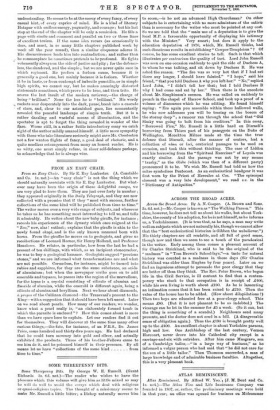SOME THREEPENNY BITS.
Some Threepenny Bits. By George W. E.• Russell. (Grant Richards. 3s. 6d. net.)—The reader who wishes to have the pleasure which this volume will give him as little mixed as may be will do well to avoid the essays which deal with religious or quasi-religious topics. • The thought of a missionary seems to make Mr. Russell a little bitter; a Bishop naturally moves him to scorn,—is he not an advanced High Churchman? On other subjects he is entertaining with no more admixture of the satiric than is necessary for the writer who must be pointed at any cost. So we are told that the " main use of a deputation is to give the local M.P. a favourable opportunity of displaying his intimacy with the Minister." Very smart; but does it apply to the education deputation of 1870, which, Mr. Russell thinks, had such disastrous results in establishing " Cowper-Templeism" ? Of course, he has some excellent stories to tell. Such is that which illustrates per contrarium the quality of tact. Lord John Russell was seen on one occasion suddenly to quit the side of Duchess A, to whom he was talking, and sit down by Duchess B. He was asked the reason. "The fire was so very hot that if I had sat there any longer, I should have fainted." " I hope," said his friend, " that you told Duchess A. why you left her." " No," replied Lord John, " I didn't tell her that; but I told Duchess B why I had come and eat by her." Then there is the anecdote about Mr. Simpkinson's sermon. He was called on suddenly to preach in the chapel of Harrow School, and took up a proof of a volume of discourses which he was editing. He found himself saying.: " Ere again you assemble within these hallowed walls, he who now addresses you will be tossing on the bosom of the stormy deep " ; a rumour ran through the school that " Old Simky was going to bolt from his creditors." In this essay, " Borrowed Fire," Mr. Russell is a little hard on Disraeli's borrowing from Thiers part of his panegyric on the Duke of Wellington. Monckton Milnes made at the time the true defence that Disraeli, after the manner of orators, had a collection of 7417rOt or loci, oratorical passages to be used on occasion, and took this without thinking. The case of Liddon and his borrowing from the " Spiritual Exercises " of Loyola was exactly similar. And the passage was not by any means "trashy," as the Globe (which was then of a different party) pronounced it to be. We wish Mr. Russell had told us how the mitre symbolises Pentecost. As an ecclesiastical headgear it was first worn by the Priest of Hercules at Cos. "The episcopal element was a very late development," we read s.v. in the " Dictionary of Antiquities."




























































 Previous page
Previous page